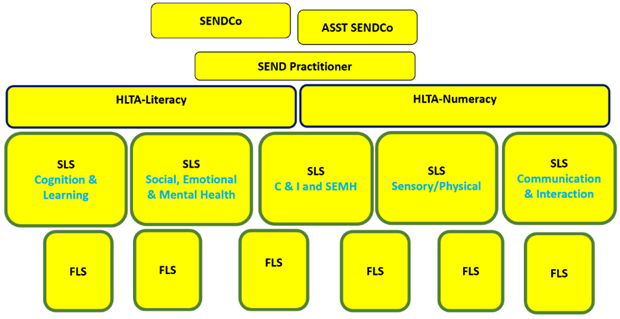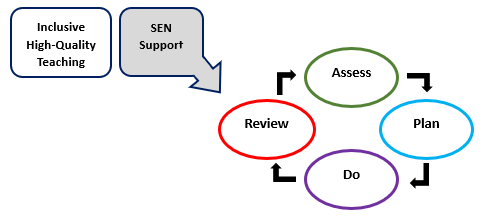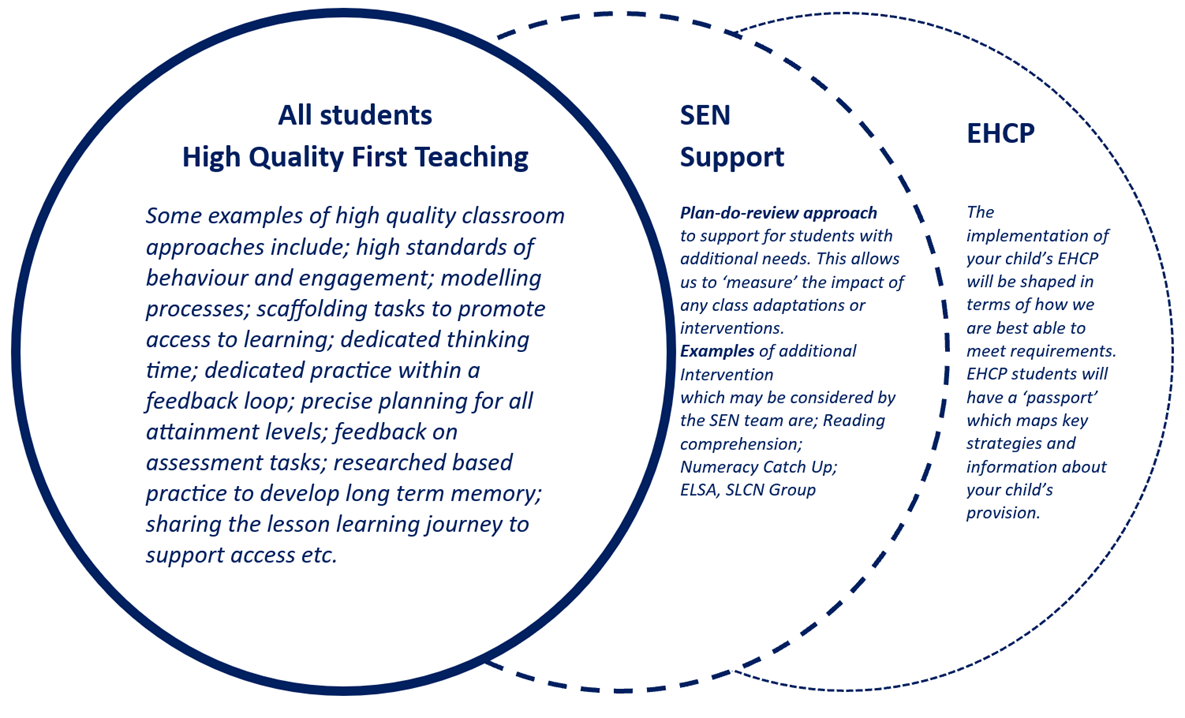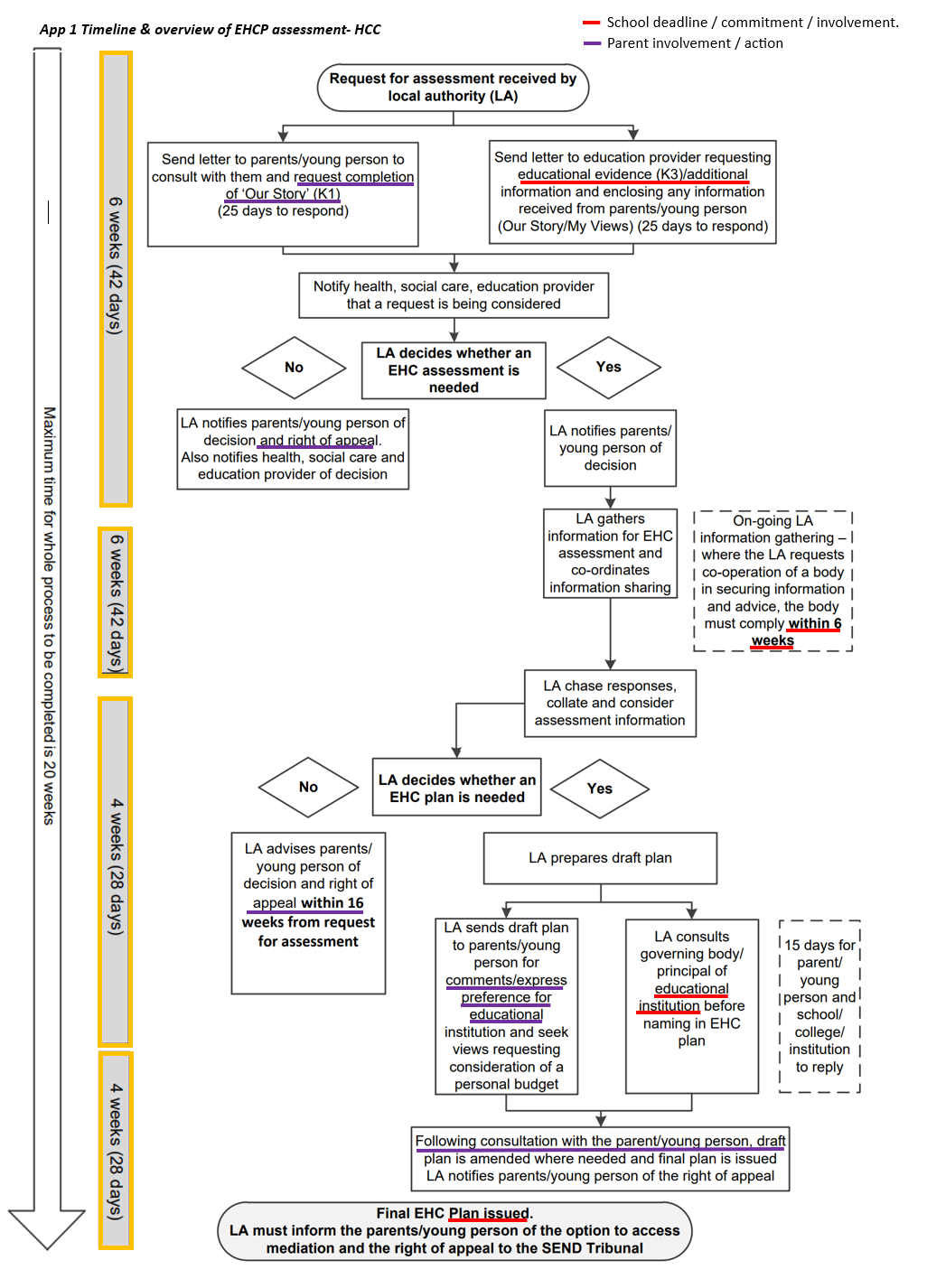The SEND Department
Implementation- High quality and effective support for students with SEND at Brighton Hill School
This brief outline is intended to communicate our ambition for all students, to recognise difference and to support students who have additional SEN needs in a positive and effective manner. It aims to assist and clarify aspects of our SEN support provision, and links to the Code of Practice and collaboration with the Local Authority. We believe that excellent educational outcomes alongside strong personal development are an entitlement of all students at Brighton Hill School. We focus our strategic support around effective monitoring, collaboration and strategic thinking which is then linked to the expected levels of progress for the student. This document has been produced in line and in full support of the ‘Schools: guide to the 0 to 25 SEND code of practice’ and our school policy for SEND.
 |
Parental contact/communication
|
 |
Strategic support / adaptations etc.
|
How will I know how my child is progressing and how will you help me to support my child’s learning?

- The progress and attainment levels of students with special educational needs are regularly analysed and reports are reviewed by Heads of Faculty, Heads of year and the Senior Leadership Team.
- Parents are contacted by phone by either subject teachers, Head of Faculty, Head of Year, or a member of the SEN team if there is a cause for concern in relation to your child making ‘expected progress’, or any significant changes regarding your child’s support and by email when a new programme of intervention is planned.
How does the school know how well my child is doing?


- Through regularly review of progress data, attendance, attitude to learning, behaviours and conduct matters, as well as discussion and collaboration with the tutor, teachers and Head of Year, we are able to identify and responding to SEND. If, for example, despite consistently high-quality teaching, a student experiences difficulties in accessing the same learning as their peers of a broadly similar age or needs much greater support we will communicate with parents/ carers and review any support if needed.
- As part of the teacher professional standards, all class teachers monitor and review students’ progress throughout the year.
- Student progress data is collected at three points throughout the academic year, from all class teachers, showing the current level of attainment of all the students they teach. This means that class teachers, Heads of Faculty and Heads of Year can track the progress of students across the school year and make classroom based adjustments if students experience barriers to progress.
Parents will receive this data via the issuance of progress trackers and can be discussed at the scheduled parents evenings. - In the event of a scheduled intervention programme, progress is reviewed either half termly or termly. These programmes are reviewed by the SENDCo and SEN Team, who uses the information to plan and design support.
What opportunities will there be for me to discuss my child’s progress if I have a significant concern?

- The most effective route is to contact your child’s tutor and or the Head of Year. There is considerable collaboration with the SEN team and the Head of year and as such they will be able to communicate with the SEN team and signpost in further communication and collaboration is required.
What support will my child receive if they have an identified educational need?


- We are committed to high quality, inclusive teaching for all students regardless of need. We have high aspirations and expectations of all students to best support progress, belonging, safety and success.
- Our provision is arranged to meet our students’ needs, within the resources available to us as a mainstream school. The following is an extract from the Code of Practice introduction:
‘A child or young person has special educational needs if they have a learning difficulty or disability which calls for special educational provision to be made for him or her.
'A child of compulsory school age or a young person has a learning difficulty or disability if he or she:
Has a significantly greater difficulty in learning than the majority of others of the same age, or
Has a disability which prevents or hinders him or her from making use of facilities of a kind generally provided to others of the same age in mainstream schools or mainstream post-16 institutions.’ - Students with special educational needs and/or disability are identified by BHCS staff, primary schools, parents, and other professionals. All new students have their reading and spelling skills assessed within the first week of joining BHCS to ensure that literacy difficulties are identified. We manage and support students identified regardless of a ‘diagnosis’.
- Our approach reflects the fact that different students require different levels of support in order to achieve age expected attainment.
- As a mainstream school we adopt a graduated approach and recognise students as individuals, one size will not fit all, and areas of need may vary.
- Students with SEN will be provided with support and clarity in relation to our school policies regarding behaviour and conduct. Regardless of this all students are expected to meet the standards within our policies.
SEN Support -First Step-High Quality Teaching


- Universal, high-quality teaching is the first step in responding to any student who may have an additional need. All teachers are teachers of students with SEND. As such our team regularly receive training, updates, and resources regarding high quality teaching for all students.
- Some examples of high quality classroom approaches include; high standards of behaviour and engagement; modelling processes; scaffolding tasks to promote access to learning; dedicated thinking time; dedicated practice within a feedback loop; precise planning for all attainment levels; feedback on assessment tasks; researched based practice to develop long term memory; sharing the lesson learning journey to support access etc.
- There is strong collaboration with our SEN team (outline below) who liaise and support students, to differing degrees based on need. This may include in-class support as well as oversight by an allocated key adult within the SEN team.
SLS- Specialist Learning Support. FLS- Faculty Learning Support.


- The school has invested above and beyond to review, re-establish, and develop an evidence-based approach to our SEN support team. This innovative approach establishes high quality support at the heart of our teaching and learning curriculum.
- The SENDCo and SEN team consult with class teachers, Heads of Faculty and Heads of Year, as well as with other support staff, to discuss if a student has additional needs and what support would be appropriate. This could include small but significant adaptations to classroom and support provision.
- We adopt a plan-do-review approach to support for students with additional needs. This allows us to ‘measure’ the impact of any class adaptations or interventions, for example the impact of a change to seating, visual approaches, task identification, emphasis on meta cognition etc.
- Examples of additional Intervention which may be considered by the SEN team are; Reading comprehension, spelling and handwriting intervention; accelerated reading accuracy programme; Numeracy Catch Up sessions; 1:1 support is delivered as a 6-12-week individualised programme; ELSA, SLCN Group
- Parents will be notified of any planned interventions and informed of time, length, content, purpose etc. Once the intervention has commenced parents will receive a copy of an IEP detailing targets.

Educational Health Care Plan





- Where, despite the school having taken relevant and purposeful steps to identify, assess and meet the SEN of your child (through SEN Support stages) your child may not make sustained expected progress. In this case it may be worth requesting an Education Health and Care needs assessment.
- Educational Health Care plans are the responsibility of the Local Authority who communicate, oversee, and issue these based on their assessment process.
- We make a formal commitment to meet the legal obligations in all EHCP’s. However, as a mainstream school when we are asked if we can meet the need of an EHCP, we will always be transparent and state if we cannot. (Ref timeline / flow chart App 1).
- If named as the placement school, this may involve provision being very different to that stipulated on the EHCP and we will shape what we can offer as best as we can, with the resources we have.
- You / we may wish to communicate to the Local Authority about alternative provision if we cannot meet need. This could be undertaken in a review of the EHCP.
- The implementation of your child’s EHCP will be shaped in terms of how we are best able to meet requirements, e.g., 60 minutes of weekly intervention, may be ‘chunked’ in to three twenty minute ‘sessions’.
- All EHCP’s are overseen in school by our SENDCo and Assistant SENDCo. However other members of the SEN team may liaise with parents given their specialist roles.
- As a school we have a significant number of students issued with an EHCP and as such daily or event weekly communication cannot be expected, unless we have agreed this is required, as part of a short-term provision. In addition to all whole school reporting, we will communicate with you about your child’s progress leading up to and at the annual review.
- All EHCP students will have a ‘passport’ which we disseminate to class teachers and share with you. This is a school provision which maps key strategies and information about your child’s provision and supports high quality teaching with the aim of meeting need.
- As a school, we value communication with parents with regards to any EHCP application. If requested by the LA, we will provide additional information, as suggested within the Local Authorities guidance to outline the progress and ‘status’ of the student. (Ref timeline / flow chart App1). Given the considerable number of staff involved in information gathering, we can only provide information towards the timeline during school terms times.
- On receipt of being the named school on an EHCP we will endeavour to commence a plan of implementation as soon as possible. Considerable dissemination and collaboration may be involved. If delays are expected, we will communicate these to you directly


